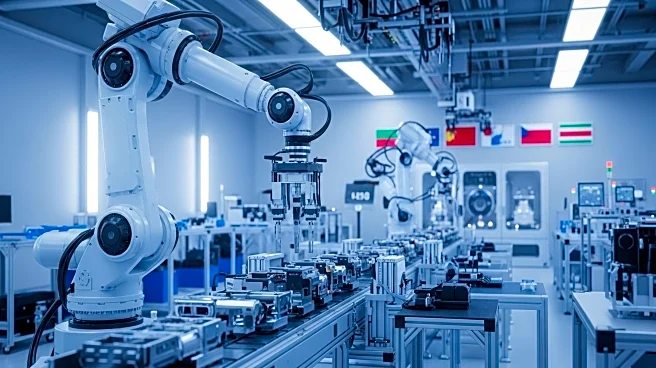What's Happening?
Ford and Boeing are utilizing artificial intelligence (AI) to enhance their manufacturing processes and improve operational efficiency. Ford has integrated AI-powered robotics and machine learning algorithms to refine precision in welding, painting, and assembly, while also employing collaborative robots to work alongside human employees, thereby reducing workplace injuries. Predictive maintenance systems have been implemented to minimize unplanned downtime by preemptively identifying equipment failures. Despite a decline in revenue, Ford's hybrid and commercial vehicle divisions have shown resilience, with the F-150 Lightning selling 40,000 units in Q2 2025. Boeing, on the other hand, has seen a surge in aircraft deliveries, aided by AI-driven quality control and supply chain optimization. The company is also focusing on sustainability initiatives, including a net-zero emissions plan. Midsize manufacturers in the aerospace sector are similarly leveraging AI to address supply chain volatility and regulatory compliance, with AI-powered predictive maintenance systems enhancing productivity and reducing production halts.
Why It's Important?
The adoption of AI by major companies like Ford and Boeing signifies a transformative shift in the manufacturing and aerospace industries. AI is enabling these companies to improve efficiency, reduce costs, and enhance safety, which is crucial in maintaining competitiveness in a rapidly evolving market. For Ford, AI investments are critical in offsetting losses in the electric vehicle segment, while Boeing's use of AI is essential for rebuilding trust and ensuring compliance with sustainability goals. Midsize manufacturers are also benefiting from AI, allowing them to compete with larger industry players by improving forecasting accuracy and operational resilience. This democratization of innovation through AI is reshaping industry dynamics, offering new opportunities for growth and competitiveness.
What's Next?
As AI continues to be integrated into manufacturing and aerospace operations, companies are likely to further enhance their processes and expand their capabilities. Ford and Boeing may continue to invest in AI technologies to address challenges in their respective sectors, such as electric vehicle production and aircraft delivery. Midsize manufacturers are expected to leverage AI to improve supply chain management and regulatory compliance, potentially leading to increased market share and competitiveness. Investors are encouraged to recognize the potential of AI-driven growth in these industries, as AI adoption is poised to improve operational efficiency and resilience.
Beyond the Headlines
The integration of AI in manufacturing and aerospace not only impacts operational efficiency but also raises ethical and regulatory considerations. As companies increasingly rely on AI for decision-making, issues related to data privacy, algorithmic bias, and transparency may arise. Additionally, the shift towards AI-driven processes may lead to changes in workforce dynamics, requiring new skills and training for employees. The long-term implications of AI adoption in these industries could include shifts in global competitiveness, with companies that successfully integrate AI gaining a strategic advantage.









